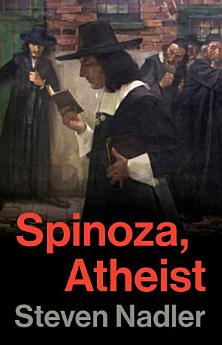Spinoza, Atheist
Steven Nadler
Apr 2026 · Princeton University Press
Ebook
240
Pages
family_home
Eligible
info
infoThis book will become available on April 7, 2026. You will not be charged until it is released.
About this ebook
From Pulitzer Prize finalist Steven Nadler, a fascinating historical and philosophical narrative that unravels the mystery of whether Spinoza was an atheist
In 1656, a young Amsterdam merchant was excommunicated by his Portuguese-Jewish community in the harshest terms it had ever used. Baruch Spinoza was accused of unspecified “horrifying heresies,” but the precise reasons for his expulsion remain a mystery. When he published his Theological-Political Treatise in 1670, which was condemned as “the most atheistic book ever written,” he began to reveal to the world what his heresies may have been. Yet ever since the eighteenth century, most readers and scholars have assumed that Spinoza was a pantheist—even a “God-intoxicated man,” as the poet Novalis put it. After all, how could a person whose books are suffused with talk of God be an atheist? In Spinoza, Atheist, Steven Nadler, one of the world’s leading authorities on the philosopher, aims to settle the question and show that that’s exactly what he was.
Nadler makes a powerful case that there is no real divinity for Spinoza. God is Nature, and isn’t an object of worshipful awe or religious reverence but can only be understood through philosophy and science. There is nothing supernatural—no mystery, ineffability, or sublimity. Spinoza does speak of “blessedness” and “salvation,” but these, too, are to be understood in natural and rational terms, as the peace of mind and happiness that come from understanding ourselves and the world.
Whether Spinoza believed in God is a fascinating and enduring controversy. Spinoza, Atheist promises to transform our understanding of his views and to make clear just how radical a thinker he was and remains.
In 1656, a young Amsterdam merchant was excommunicated by his Portuguese-Jewish community in the harshest terms it had ever used. Baruch Spinoza was accused of unspecified “horrifying heresies,” but the precise reasons for his expulsion remain a mystery. When he published his Theological-Political Treatise in 1670, which was condemned as “the most atheistic book ever written,” he began to reveal to the world what his heresies may have been. Yet ever since the eighteenth century, most readers and scholars have assumed that Spinoza was a pantheist—even a “God-intoxicated man,” as the poet Novalis put it. After all, how could a person whose books are suffused with talk of God be an atheist? In Spinoza, Atheist, Steven Nadler, one of the world’s leading authorities on the philosopher, aims to settle the question and show that that’s exactly what he was.
Nadler makes a powerful case that there is no real divinity for Spinoza. God is Nature, and isn’t an object of worshipful awe or religious reverence but can only be understood through philosophy and science. There is nothing supernatural—no mystery, ineffability, or sublimity. Spinoza does speak of “blessedness” and “salvation,” but these, too, are to be understood in natural and rational terms, as the peace of mind and happiness that come from understanding ourselves and the world.
Whether Spinoza believed in God is a fascinating and enduring controversy. Spinoza, Atheist promises to transform our understanding of his views and to make clear just how radical a thinker he was and remains.
About the author
Steven Nadler is Vilas Research Professor and the William H. Hay II Professor of Philosophy at the University of Wisconsin–Madison. His many books include Rembrandt’s Jews, which was a finalist for the Pulitzer Prize, Spinoza: A Life, Think Least of Death: Spinoza on How to Live and How to Die (Princeton), and A Book Forged in Hell: Spinoza’s Scandalous Treatise and the Birth of the Secular Age.
Reading information
Smartphones and tablets
Install the Google Play Books app for Android and iPad/iPhone. It syncs automatically with your account and allows you to read online or offline wherever you are.
Laptops and computers
You can listen to audiobooks purchased on Google Play using your computer's web browser.
eReaders and other devices
To read on e-ink devices like Kobo eReaders, you'll need to download a file and transfer it to your device. Follow the detailed Help Center instructions to transfer the files to supported eReaders.







